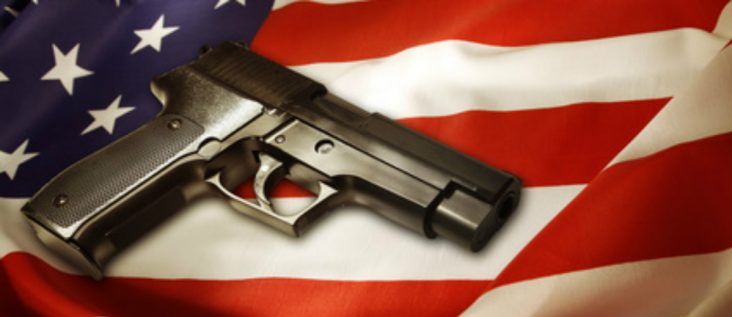Gov. Hutchinson signs enhanced guns on campus bill, new amendment proposed to exempt UAMS, State Hospital
by March 22, 2017 3:51 pm 1,246 views

Gov. Asa Hutchinson, supported by a phalanx of lawmakers and a representative from the National Rifle Association, signed controversial legislation into law on Wednesday that would allow concealed carry permit-holders with enhanced training to carry firearms on college campuses and at an expanded list of public places.
But less than an hour after the governor put his signature on HB1249, the Senate Judiciary Committee approved an agreed-upon amendment to the newly enacted law that exempts concealed handguns “without limitation” on the premises of the University of Arkansas for Medical Sciences, the Arkansas State Hospital and private universities or colleges that choose to opt out of the “no guns here” posting requirement.
During the morning press conference at the Governor’s Conference Room at the State Capitol, Hutchinson explained that during his tenure as deputy director of the Homeland Security Department he worked with NRA and U.S. Secret Service officials to come up with enhanced training requirements for school officials following the Sandy Hook (Conn.) Elementary School shooting in December 2012.
“I have consistently recognized there is, first of all, a Second Amendment privilege, but also a security and safety benefit from firearms by people who are properly trained,” the governor said. “It has been a consistent view of mine, so when this bill came forth there was an argument, a need and will of the General Assembly to have firearms on campuses and I said, ‘we had to have an enhanced training element to it.’”
Hutchinson also said that it was important for the public to understand there are now two levels of concealed weapon permits in Arkansas. He mentioned the state’s first concealed handgun carry licensing law pass by the Legislature in 1995 and the newly enacted law, which is now Act 310 of 2017.
“Everyone was arguing (in 1995) that the sky would fall, and that no one knew how to do this and we were going to be unsafe in Arkansas, but history has demonstrated that this works well,” he said. “And now we are moving into a new arena, a new area of change but we’re guided by the fact while we have a new permit that will allow enhanced carry, it requires more training.”
After the governor’s remarks, HB1249 sponsor Rep. Charlie Collins, R-Fayetteville, also sought to allay fears that his legislation would create panic in the public square. Collins said his sole goal in working on the so-called guns on campus bill over the past several years was to protect students and faculty and prevent “rampage killings” on college campuses.
“There is no way to identify these people in advance. There (are) no racial variables, … no mental health variables, no prison record variables. These people don’t snap spontaneously and whip a weapon out of their pocket. They research, they FOIA request for security records. They do all the things you would expect someone to do who is trying to mercilessly harm our loved ones,” Collins said. “The one thing they cannot do is plan for a good guy and good guy with a gun to upset their plan.”
Under the newly enacted law, concealed carry licensees can carry their weapons at public and state-supported universities along with public buildings, including the Capitol grounds, if they have completed an eight-hour active shooter training designed by the Arkansas State Police. They also can carry a weapon in places of worship, bars and certain restaurants, unless those establishments post a notice prohibiting guns at those locations. Exceptions include courtrooms and administrative hearings, K-12 public schools, and state prison facilities.
A much different version of the bill passed the House earlier in the session. The original bill allowed only faculty and staff with a concealed carry permit to carry a weapon on college campuses. It eliminated an opt out provision contained in legislation passed in 2013 and also sponsored by Collins. Under that law, public higher education institutions could allow their staff members to carry a weapon, but they also could opt out of allowing them to do so. All of the state’s colleges and universities opted out.
Still, Act 310 could see further changes if the full legislature approves Senate Pro Tempore Jonathan Dismang’s Senate Bill 274. At the governor’s press conference, the Searcy Republican said everyone agreed that the newly enacted law has some concerns that needed to be addressed.
“To that question about some of the concerns in (HB1249), everyone here has kind of acknowledged … that there were some issues – it is an imperfect bill,” Dismang said.
Collins, in response to reporters’ questions, said he was open to additional changes proposed by Dismang, but offered that some details of the legislation would be fleshed out through the end of 2017. The effective date of the new law is Sept. 1, 2017, but the State Police Department has 120 days to work out the details and design of the enhanced training program.
Over the course of more than a month, the Senate Judiciary panel amended HB1249 six different times, starting with a so-called hostile amendment by Sen. Jeremy Hutchinson, R-Little Rock, that would have required concealed carry permit holders to obtain at least 16 hours of active shooter training designed by the Arkansas State Police.
In response to questions from reporters, Arkansas State Police Chief William Bryant said nearly 221,000 gun owners in Arkansas have concealed carry licenses. Bryant said State Police personnel will work with public and private partners to design and promulgate new rules for the enhanced concealed carry program by Jan. 1, 2018.
